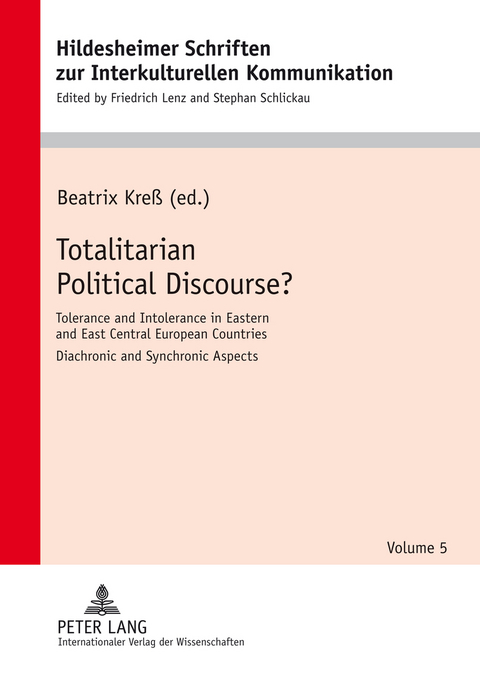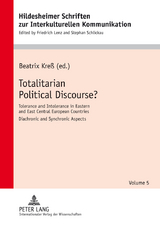Totalitarian Political Discourse?
Peter Lang Gmbh, Internationaler Verlag Der Wissenschaften
978-3-631-63276-5 (ISBN)
This volume contributes to the study of political and especially totalitarian language in the countries of the former Eastern Bloc, by bringing together not only diachronic and synchronic aspects, but also by including different media types, such as newspapers, the internet, and different discourse types, e.g. environmental and gender discourses. The combination of historical and contemporary perspectives in many contributions add comparative dimensions, while also shedding light on relevant socio-political developments and phenomena in those post-communist countries, thus uniting linguistic methods with cultural studies.
Beatrix Kreß is assistant professor for intercultural communication at the University of Hildesheim. She studied Slavic languages and literature in Frankfurt am Main and Prague, and received her PhD in Russian and Czech linguistics (the language of conflict in Russian and Czech from a pragmalinguistic perspective).
Contents: Beatrix Kreß: Introduction - Holger Kuße: Emotive signs and evaluation in totalitarian language: About Bexu and Andrey Vysinskij - Claudia Woldt: Deontic modality in political discourse - expressions of tolerance and intolerance in Czech parliamentary debates before and after 1989 - Vladislava Warditz: Totalitarianism - Anti-totalitarianism - Post-totaliarianism? A historical perspective on totalitarian discourse in Russian linguistics - Karen Gammelgaard: Totalitarian self-designation: the case of jednota in the Czech totalitarian register 1948-1953 - Dmitrij Dobrovol'skij/Ludmila Pöppel: The semantic field of POWER and political propaganda: (revolution) vs. (coup) and (uprising) vs. (revolt) - Tora Hedin: Changing media discourse - the Czech daily Rudé právo in the Stalinist years - Ioulia Grigorieva: Moralizing speech acts in German and Russian print media during the 2008 South Ossetia War - Beatrix Kreß: Is there a totalitarian language in non-totalitarian states? - Marina Scharlaj: Personalization, visualization and McDonaldization of power in Belarus - Liana Goletiani: Environmental discourse in Russia - linguistic cultural traditions and contemporary metaphors - Sabine Borovanská: Doing gender by Czech politicians and their partners.
| Erscheint lt. Verlag | 23.11.2012 |
|---|---|
| Reihe/Serie | Hildesheimer Schriften zur Interkulturellen Kommunikation. Hildesheim Studies in Intercultural Communication ; 5 |
| Verlagsort | Frankfurt a.M. |
| Sprache | englisch |
| Maße | 148 x 210 mm |
| Gewicht | 370 g |
| Themenwelt | Literatur ► Klassiker / Moderne Klassiker |
| Geisteswissenschaften ► Sprach- / Literaturwissenschaft ► Slavistik | |
| Geisteswissenschaften ► Sprach- / Literaturwissenschaft ► Sprachwissenschaft | |
| Sozialwissenschaften ► Politik / Verwaltung ► Politische Theorie | |
| Schlagworte | Aspects • beatrix • Belarus • Central • Collaboration • Countries • Czech parliamentary debates • diachronic • discourse • Discourse? • East • Eastern • European • intolerance • Karsten • kreß • McDonaldization • Osteuropa • Political • Russian linguistics • Schlickau • Senkbeil • stephan • Synchronoc • Tolerance • Totalitäre Sprache • totalitarian • with |
| ISBN-10 | 3-631-63276-2 / 3631632762 |
| ISBN-13 | 978-3-631-63276-5 / 9783631632765 |
| Zustand | Neuware |
| Haben Sie eine Frage zum Produkt? |
aus dem Bereich




